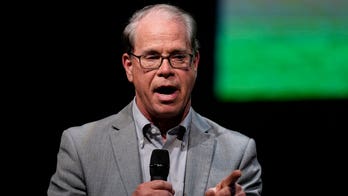Fed up with increasing union dues and a decreasing say in how the money is spent, three California groups are challenging their big labor bosses in landmark cases that could change how unions operate in the Golden State.
In one, a group of 10 public school teachers is trying to change a state law that forces them to pay union dues as well as pay for an opt-out procedure for members’ political contributions to unions.
They argue in Friedrichs v. California Teachers Association that being required to pay dues violates their constitutional rights because part of the money goes to promote a political agenda they don’t necessarily support.
Public school teachers in California operate under an “agency shop” that allows all teachers in a district to be represented by one union. Nonunion teachers, though, must still pay fees for the union’s collective-bargaining work.
The issue, they say, is that they don’t necessarily agree with the union’s political agenda, which includes greater tenure protections and bumps in pay.
“What you have are teachers increasingly finding themselves disagreeing with how the money is spent and they lose leverage,” Terry Pell, president of the Center for Individual Rights, which filed the suit on behalf of the teachers and the nonprofit religious organization Christian Education Association International, told FoxNews.com.
Pell believes the suit, which has reached the Ninth Circuit Court of Appeals, is likely headed for a national showdown at the U.S. Supreme Court. But it won’t be an easy case to win.
The annual union fees for nonunion teachers are more than $1,000, which includes about $350 in fees for political union activities they can choose to opt out of, according to the complaint. But Pell argues it’s a complicated and cumbersome process.
“In one way, it’s an uphill struggle for us going against one of the most powerful unions in California, but we do know now the court is interested,” Pell said.
“There are a number of different cities in California that are bankrupt and many of the parents of the children are either underemployed or out of a job,” Pell said. “If you are a teacher on the ground and you are seeing that, you may have a different take on what’s appropriate and what’s in balance.”
In Sacramento, a group of state workers is fighting a similar opt-out procedure for political dues.
In Hamidi v. SEIU, workers say they don’t want to be forced to “opt out” of paying dues that fund the Service Employees International Union’s political agenda. Instead, they want the court to allow an “opt in” system for those who want to contribute.
Ken Hamidi, with help from the National Right to Work Foundation, filed the federal class-action complaint in which he argues that the union didn’t give members a fair chance in 2005 and 2006 to opt out of a special assessment that funded political activities.
If Hamidi wins, the union would have to ask nonmember fee payers’ permission before collecting full dues.
Legal experts are also keeping a close eye on another California case that tackles the topic of teacher tenure.
In Vergara v. California, nine Los Angeles public school students are challenging the state law that grants teachers tenure after being on the job for only 18 months. The students argue that California’s code on seniority, tenure and dismissal of teachers violates their rights to an adequate education.
In recent years, dozens of states have eliminated or toughened standards on giving teachers permanent employment protection. The unions argue that getting rid of the laws removes an important support system to a profession that has lost good public school educators to the private sector.
Josh Pechthalt, president of the California Federation of Teachers, recently told the LA School Report that the lawsuit lacks merit.
"It ignores the real problems of education and demonizes teachers and teachers unions for the perceived problems of public education,” he said.




